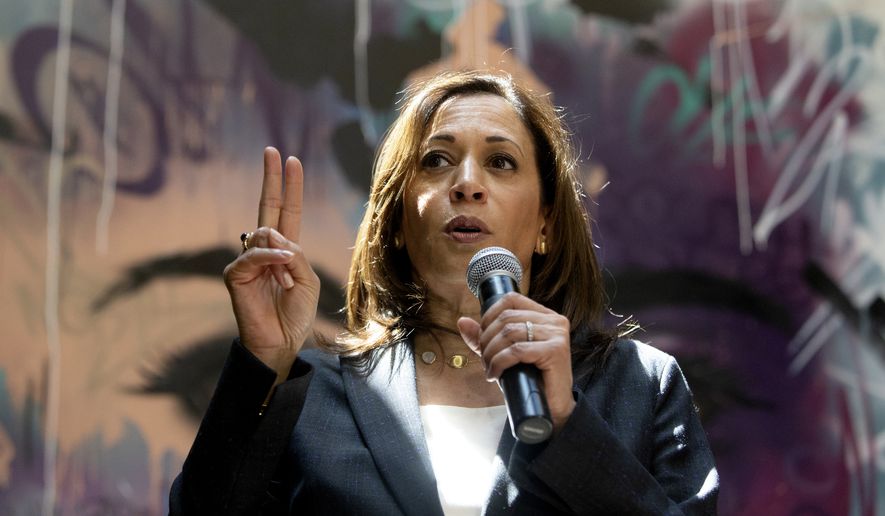Sen. Kamala D. Harris’ presidential campaign has shown an uncanny ability to squander chances. Each time the California Democrat’s run has appeared to catch fire, with a breakout debate performance or a headline-grabbing policy stance, she has managed to douse the flames.
Yet political veterans, including operatives inside the Trump campaign, said she is still a real contender, perhaps the most formidable Democrat in a general election contest against the president.
“The one who scares me the most in the general is Kamala Harris,” said a key player inside President Trump’s reelection campaign. “The top candidates are all flawed candidates, but the least flawed is Kamala Harris.”
The operative, who did not want to be identified discussing internal campaign deliberations, acknowledged that the warning about Ms. Harris was a minority view in the Trump world.
The reelection team remains focused on a challenge from former Vice President Joseph R. Biden, the front-runner in the Democratic race. They are also prepping for a matchup with Sen. Elizabeth Warren of Massachusetts, whom conventional Beltway wisdom sees as the likeliest candidate to snatch the nomination from Mr. Biden.
Ms. Harris, a woman of color with Jamaican and Indian heritage, has the potential to emerge as a historic figure rivaling the Obama mold, but she has provided plenty of reasons to doubt her staying power in the Democratic race.
She launched her presidential bid in January to huge fanfare and fawning press coverage. The kickoff rally in her hometown of Oakland drew an estimated 20,000 people — more than the 13,000 who turned out to see Sen. Bernard Sanders’ 2020 debut or the 15,000 who flocked to see Barack Obama launch his 2008 campaign.
Within months, though, Ms. Harris slid into single digits in the polls and was vying for fourth or fifth place with Mayor Pete Buttigieg of South Bend, Indiana, and former Rep. Beto O’Rourke of Texas.
A former California attorney general, Ms. Harris garnered cheers from liberal voters when she called for decriminalizing marijuana. But she joked that her Jamaican heritage bolstered her position, provoking a rebuke from her father and other Jamaicans for perpetuating a stereotype.
Next, when rival Rep. Tulsi Gabbard of Hawaii accused her of flip-flopping from being a marijuana opponent as a prosecutor and attorney general, Ms. Harris failed to deliver a comeback and came across as the loser in the exchange.
In one of the brightest moments of her run, Ms. Harris confronted Mr. Biden at the June debate in Miami. She chastised him for opposing federally mandated busing to desegregate public schools in the 1970s. She surged in the polls, but within days, she began hedging her positions on “Medicare for All” government-run health care and even on busing. Her poll numbers quickly slid back into single digits, and she settled into a distant fourth place.
Ms. Harris’ backing off from a full-fledged Medicare for All program, saying she would not immediately eliminate private insurance, provided ammunition for Mr. Sanders of Vermont, whose Medicare for All legislation she cosponsored.
“Kamala Harris changed her views on her health care plan in a very significant way,” he said in an interview with Vice News published this week. “That’s her privilege. I’m not arguing with her. And she does not support what I support.”
The attack is likely to be repeated.
The Harris campaign responded by saying she put forth a plan that professionals and analysts commended as the best way to get to universal health care coverage and expand the “actual Medicare program” to all Americans.
Ms. Harris recently put out a plan that calls for a longer transition to a Medicare-style insurance system that retains a role for the private insurance industry.
Still, her evolving positions keep her on the defensive.
“This campaign of fits and starts is how they built the campaign for the long haul,” said David McCuan, a politics professor at Sonoma State University and a longtime player in California politics.
He described a careful strategy to stay in the game through the first nominating contests in Iowa and New Hampshire and then make a move in the Nevada and South Carolina primaries to springboard into the Super Tuesday primaries on March 3 that include California and Texas.
“She wants to come out of there not necessarily with the most delegates but in the driver’s seat,” Mr. McCuan said.
The challenge for the Harris campaign is managing expectations to keep her from disappointing as she gets through the Feb. 3 Iowa caucuses and Feb. 11 New Hampshire primary.
The failure to manage expectations only added to the impression of backsliding.
The early stumbles, however, could be nothing more than campaign growing pains.
Ms. Harris has assembled an experienced campaign staff that devised her Super Tuesday strategy. The team includes California-based SCRB Strategies, with Ace Smith, a top voter contact consultant, and veteran messaging consultant Sean Clegg.
“She has an outstanding team, as do many of the other candidates,” said Democratic strategist Roger Salazar.
He brushed aside Ms. Harris’ ups and downs in the polls, saying it was foolish to worry about that more than five months before the first nominating contests.
“Of course there is a path for victory for her and of course she is capable of navigating it,” he said. “The smart thing to do for all the campaigns is to focus on their work, focus on their field operations, focus on their [get out the vote] plans and voter engagement programs and ignore the breathless horse race fascination of the campaign press corps.”
⦁ David Sherfinski contributed to this report.
• S.A. Miller can be reached at smiller@washingtontimes.com.




Please read our comment policy before commenting.